Ignite Your Academic Journey with These Top Textbook Picks for 2024
Hey there, fellow scholar! Are you ready to conquer 2024 with flying colors? Dive into these top textbook picks that will elevate your learning experience and help you excel in your studies.
From mastering property management to unraveling the complexities of educational psychology, these textbooks are your ultimate guide to academic success.
Let's embark on this educational adventure together and unlock your full potential!
Key Takeaways
- Engaging content to enhance learning experience.
- Clear explanations for easy comprehension.
- Updated information aligned with standards.
- Interactive activities for diverse learning styles.
- Practical relevance for real-world application.
Property Management
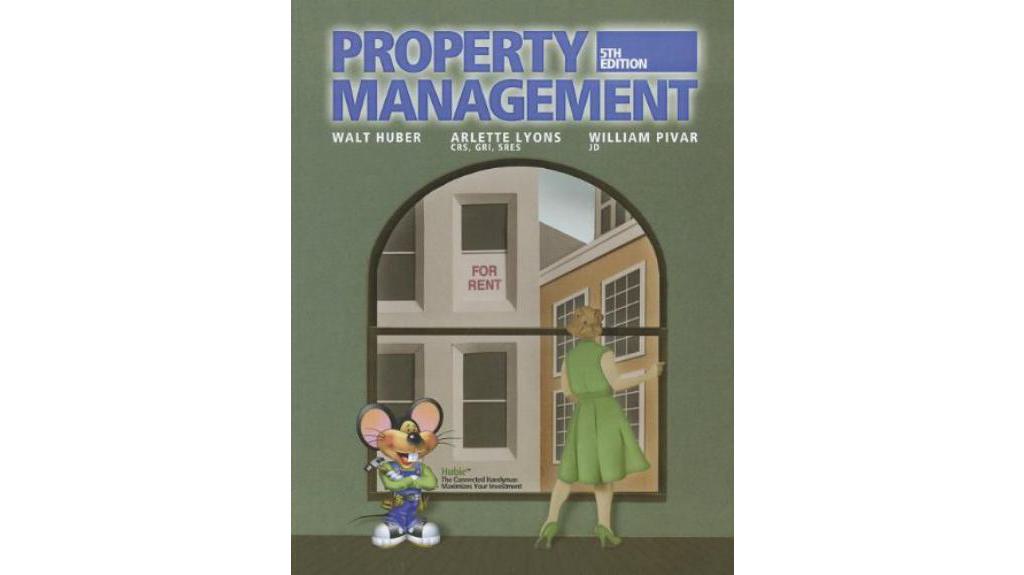
Seeking an all-inclusive guide in property management? Well, let me tell you about this book! People love it because it's easy to read and super helpful. Imagine acing your property management course with this gem – that could be you!
But, hold up, there are a few things to watch out for. Some terms mightn't match West Coast real estate, and the book skips over some day-to-day accounting stuff. Plus, it's like a time machine to outdated property laws. Ew, bugs on the pages are a turn-off.
On the bright side, the author knows their East Coast stuff. Just remember, not all advice fits every region. Overall, it's like your property management Bible – a good investment for your career journey!
Best For: Those pursuing a property management career seeking a comprehensive yet user-friendly guide.
Pros:
- Great service and easy-to-understand content
- Useful for property management courses
- Considered essential for property management career development
Cons:
- Some terms not applicable to West Coast real estate
- Light coverage on day-to-day accounting aspects
- Contains outdated property laws and may have quality issues like stained pages and bugs
Educational Psychology (14th Edition)
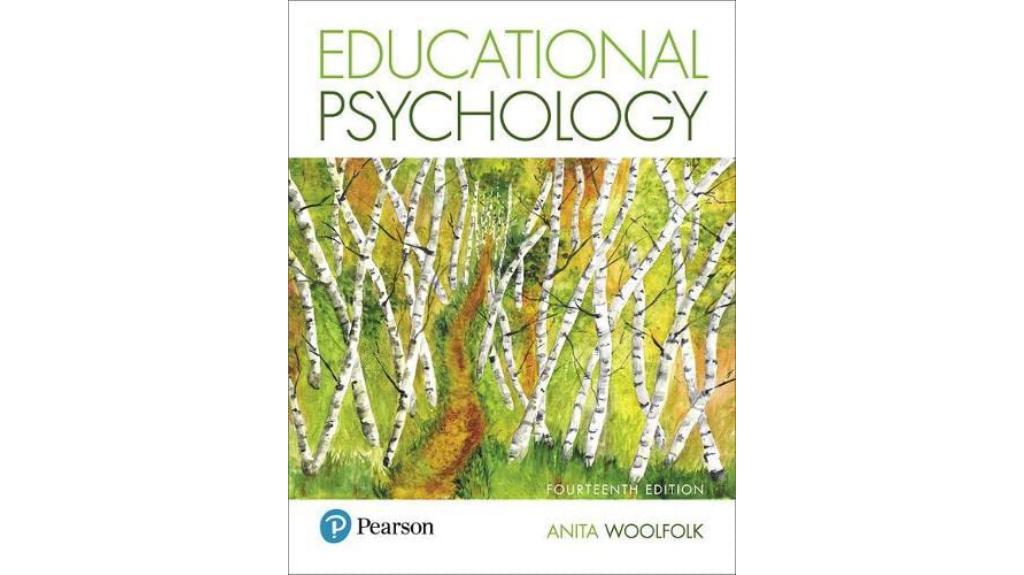
For educators looking for a thorough and engaging resource in educational psychology, the 14th edition of 'Educational Psychology' is an invaluable choice. This book is like having a super-smart friend who explains things in a way that just clicks!
You won't be bored reading this – it's like a fun adventure into the world of teaching and learning. Plus, there are cool activities to try out in the lab, making learning even more exciting. Your teacher friends will thank you for recommending this gem, and you might even become the go-to expert in educational psychology!
Just watch out for that pesky Pearson's MyLab access – make sure to get that pin from your professor. But hey, at least you can save some cash by renting it instead of buying from the college bookstore. Happy studying!
Best For: Students and professionals in the field of education seeking an engaging and comprehensive resource in educational psychology.
Pros:
- Engaging and informative content suitable for teachers and educators.
- Includes lab activities to enhance learning experience.
- Cost-effective option compared to purchasing from college bookstores.
Cons:
- Potential access issues with Pearson's MyLab requiring a pin from the professor.
- Limited accessibility options, such as renting textbooks.
- Dependency on external factors for full utilization of resources.
CLEP® Introductory Psychology Book + Online (CLEP Test Preparation)

Ideal for students preparing to take the CLEP Psychology exam, the CLEP® Introductory Psychology Book + Online offers thorough study material and practice tests for effective exam readiness.
This study guide has worked wonders for many, with users boasting about achieving a stellar 90% score on the CLEP exam after diving into its content.
Imagine cruising through topics like schools of thought, psychological disorders, and brain functions with ease, feeling like a psychology whiz in no time!
However, be aware that there are a few gaps in information, like missing details on hearing and seeing processes or some major psychologists.
But fear not, supplementing with extra resources can fill those gaps and have you on your way to acing that exam in no time!
Best For: Individuals preparing to take the CLEP Psychology exam who seek a comprehensive study guide with practice tests for effective exam readiness.
Pros:
- Thorough coverage of various psychology topics like schools of thought, psychological disorders, and brain functions.
- Online practice tests provide beneficial feedback and help in identifying weak areas for improvement.
- Effective in helping users achieve high scores on the CLEP exam and instilling confidence in their knowledge.
Cons:
- Some gaps in information, such as missing details on hearing and seeing processes and certain major psychologists.
- Requires supplementing with additional resources to cover topics not included in the guide.
- May not be sufficient as a standalone study resource for all aspects of the psychology CLEP exam.
Visual Learning: Biology: An Illustrated Guide (Barrons Visual Learning)
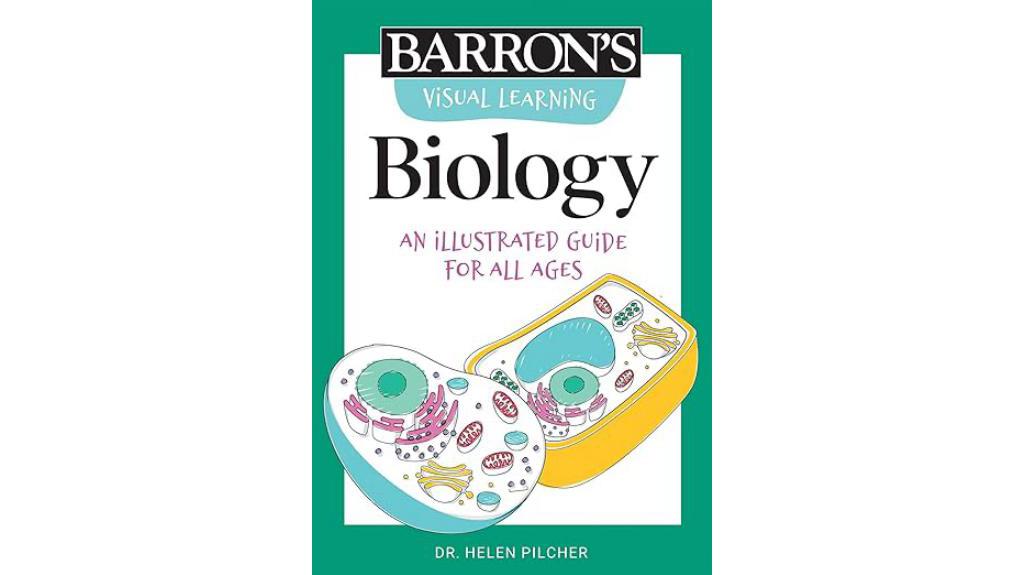
Explore the world of biology in a fun and straightforward way with the illustrated guide 'Visual Learning: Biology' by Barrons. Best suited for visual learners in high school and college, this book provides clear explanations and detailed pictures to enhance understanding of biology concepts.
Imagine flipping through a book and finding colorful diagrams that make complex ideas simple to grasp. That's what this book offers! It's like having a personal tutor right in your hands, guiding you through the fascinating world of biology with ease.
Students rave about how it helps them not only in high school but also as they tackle more advanced topics in college. The visuals are so engaging that even those with ADHD find it exciting to study.
So, if you want to explore biology in a fun and straightforward way, this book is a must-have!
Best For: Visual learners in high school and college seeking an engaging and easy-to-understand resource for biology.
Pros:
- Clear explanations and detailed pictures enhance understanding.
- Suitable for high school students and beneficial for tackling advanced topics in college.
- Engaging visuals make studying exciting, even for individuals with ADHD.
Cons:
- May not provide in-depth coverage of highly complex biological topics.
- Limited focus on interactive learning experiences.
- Some readers may prefer more interactive elements such as quizzes or activities.
Chemistry: Concepts and Problems, A Self-Teaching Guide, 3rd Edition
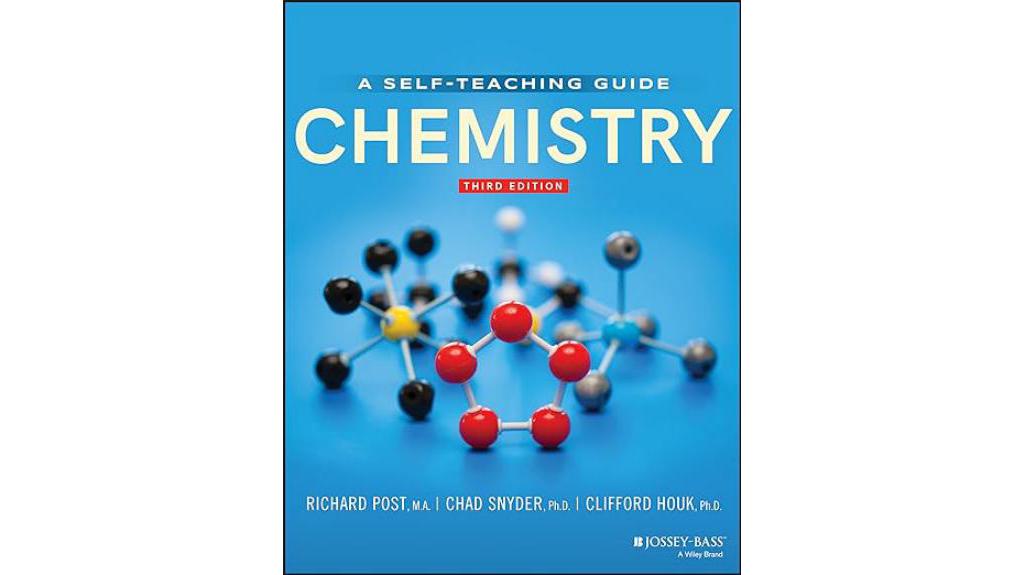
Tailored for independent learners seeking to strengthen their chemistry knowledge, 'Chemistry: Concepts and Problems, A Self-Teaching Guide, 3rd Edition' is like having a patient teacher by your side. With clear examples that explain themselves and step-by-step guidance, this book makes chemistry less like a mystery and more like a fun puzzle to solve.
Sure, there might be a few printing bloopers here and there, but hey, nobody's perfect! The self-tests at the end of each chapter are like little mini-adventures that help you explore each concept bit by bit. Plus, the colorful diagrams make everything easier to understand.
Just a heads up, some folks wish the organic chemistry part had a bit more meat to it, like a good sandwich needing extra filling. Overall, if you're ready to immerse yourself in chemistry and boost those grades, this book could be your secret weapon!
Best For: Confident learners seeking to independently strengthen their chemistry knowledge.
Pros:
- Well-written content with self-explanatory examples.
- Useful self-tests at the end of each chapter.
- Incremental instruction and testing for better understanding.
Cons:
- Some printing mistakes and typos present.
- Errors in self-tests and answer keys can lead to confusion.
- Short organic chemistry section may leave readers wanting more detail.
Teach Writing Well: How to Assess Writing, Invigorate Instruction, and Rethink Revision
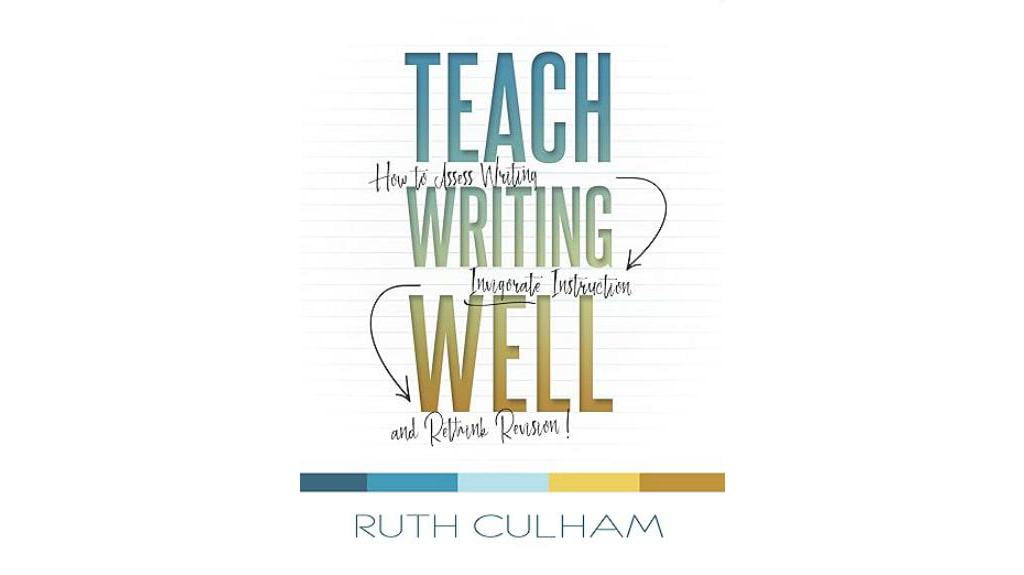
For educators seeking practical guidance on enhancing student writing skills, 'Teach Writing Well: How to Assess Writing, Invigorate Instruction, and Rethink Revision' presents valuable strategies and resources. This book is like having a writing superhero by your side, guiding you through the maze of teaching writing.
Ruth Culham, the author, has all the insider knowledge to help you bring out the best in your students' writing. From understanding different writing styles to tailoring instruction for each student, this book has got your back.
It's not just about teaching writing; it's about transforming how you see writing and how your students see themselves as writers. So, if you want to take your writing lessons from bland to grand, this book is your secret weapon!
Best For: Educators looking to transform their writing instruction and help students develop strong writing skills with practical strategies and resources.
Pros:
- Comprehensive guidance on formative assessment and differentiated instruction for diverse learners
- Integration of key qualities of the 6+1 traits into writing instruction
- Roadmap of strategies for effective teaching of writing and fostering better understanding of traits
Cons:
- May require time and effort to fully implement the strategies in the classroom
- Some educators may find the emphasis on revision and traits challenging to incorporate into existing writing curriculum
- Additional support or training may be needed for teachers unfamiliar with formative assessment and differentiated instruction
Industrial Fluid Power, Vol. 1: Basic Text on Hydraulics, Air & Vacuum for Industrial and Mobile Applications
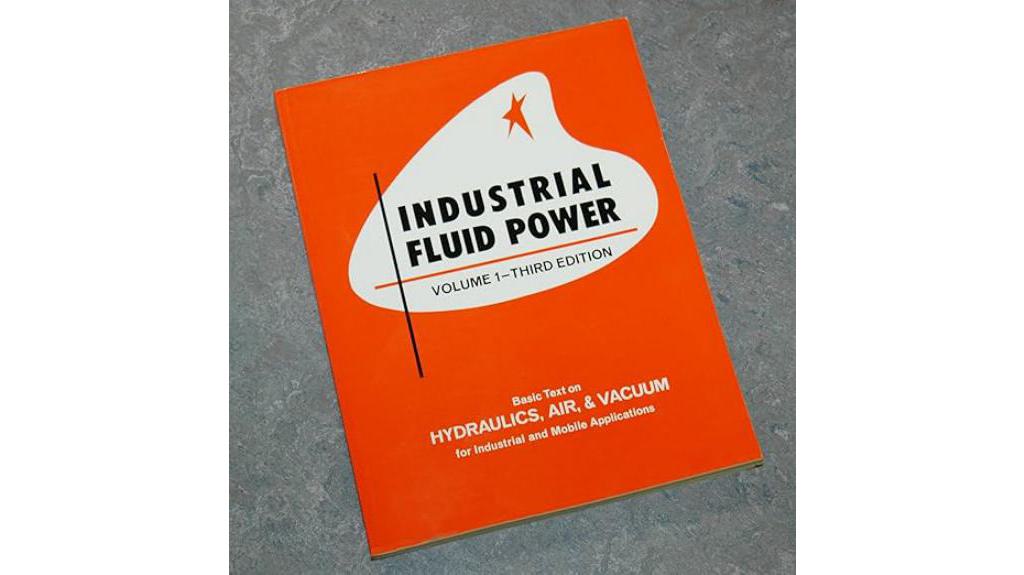
An essential resource for students seeking a thorough understanding of hydraulics, air, and vacuum systems in industrial and mobile applications is the textbook 'Industrial Fluid Power, Vol. 1: Basic Text on Hydraulics, Air & Vacuum.'
Imagine diving into the world of fluid power with this book – it's like having a superpower to control liquids and gases in machines! People who've used it say it's like discovering a treasure map to decode the secrets of hydraulics and pneumatics.
With just six chapters, you'll go from feeling puzzled by fluid systems to confidently troubleshooting them like a pro. Plus, it's not just informative; it's also a page-turner for anyone curious about how things work around us.
So, if you're ready to unravel the mysteries of fluid power, this book is your golden ticket!
Best For: Students and individuals seeking a comprehensive understanding of hydraulics, air, and vacuum systems in industrial and mobile applications.
Pros:
- Provides a good overview of hydraulics, pneumatic, and vacuum concepts.
- Offers practical examples that demonstrate the application of fluid power systems.
- Useful for understanding and troubleshooting fluid systems in real-world scenarios.
Cons:
- Limited information on advanced or specialized topics within fluid power systems.
- Some readers may find the content basic if already familiar with hydraulics and pneumatics.
- May not be suitable for those seeking in-depth technical analysis or advanced theory on fluid power.
MyLab Education with Enhanced Pearson eText Access Card for Educational Research (6th Edition)
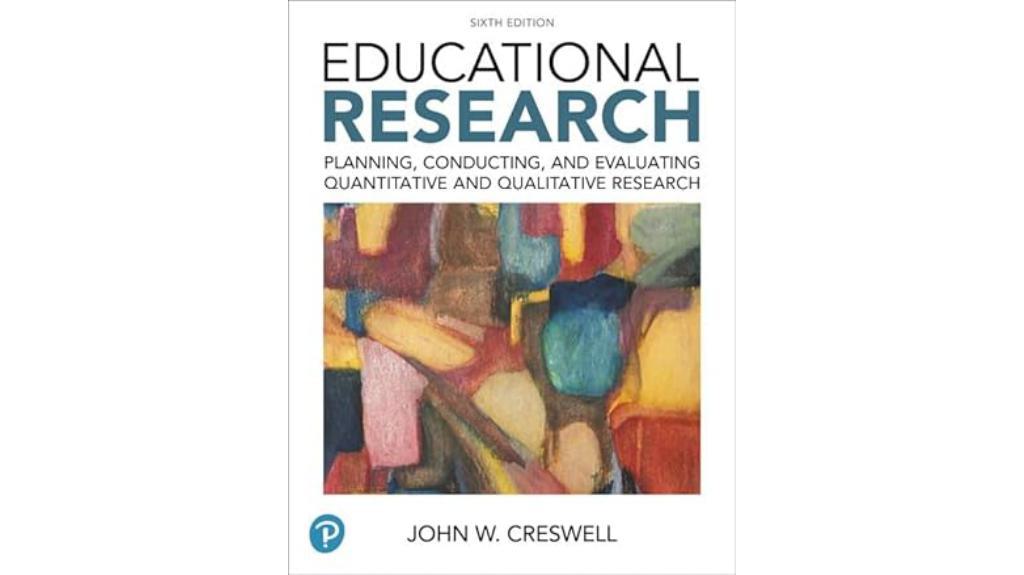
With an access code for MyLab Education and digital copy of the textbook, this product is ideal for students enrolled in an online educational research course requiring quantitative and qualitative research skills.
Imagine having all the resources you need right at your fingertips – no more lugging around heavy textbooks or searching for missing pages.
However, some users found themselves scratching their heads when they discovered they only received an access code without the physical book.
Remember, it's important to have your instructor's Course ID ready to access all the digital content smoothly. So, before you hit that 'buy now' button, double-check to make sure you're getting exactly what you need.
Stay informed, and you'll be on your way to mastering educational research in no time!
Best For: Students enrolled in online educational research courses seeking convenient access to digital resources and textbooks without the need for physical copies.
Pros:
- Provides digital copy of textbook for easy access and portability.
- Includes access code for MyLab Education for interactive learning experiences.
- Ideal for those looking to enhance their quantitative and qualitative research skills in an online setting.
Cons:
- Some users may receive only an access code without a physical textbook, causing confusion.
- Difficulty in accessing digital content without instructor's Course ID may hinder immediate usage.
- Lack of clarity in product description may lead to misunderstandings and dissatisfaction.
Visual Learning: Physics: An Illustrated Guide (Barrons Visual Learning)
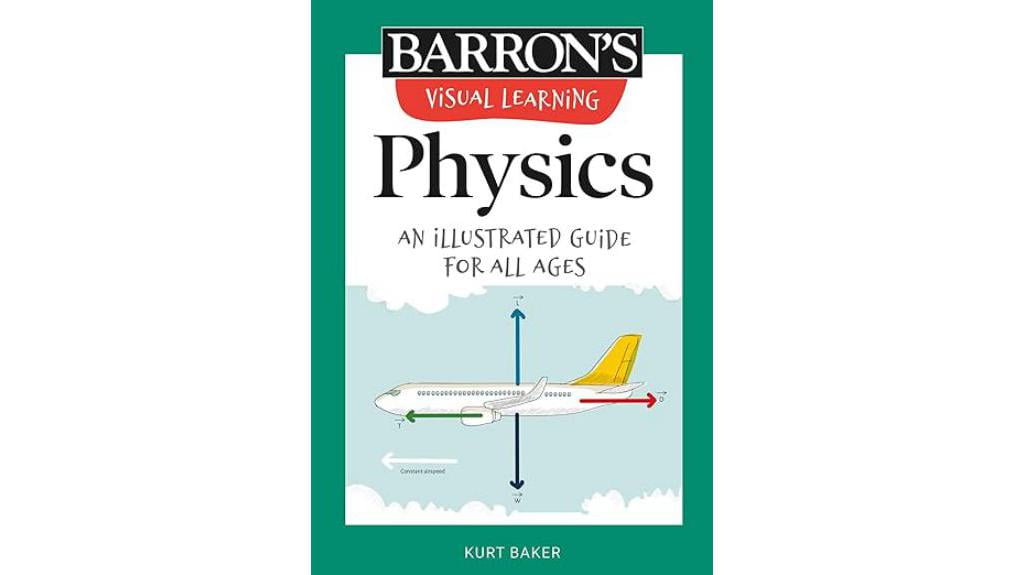
Explore how Visual Learning: Physics: An Illustrated Guide (Barrons Visual Learning) engages all ages with its compelling illustrations, making it an ideal choice for students seeking a dynamic approach to mastering physics concepts.
Imagine browsing through a book that brings physics to life with pictures that leap off the page, making complex ideas easy to grasp. Whether you're in high school, college, or even a young learner, this book has something for everyone.
The vibrant illustrations not only aid in visualizing intricate theories but also make learning physics enjoyable and thrilling. It's like having a personal tutor that communicates through visuals, guiding you through the captivating world of physics without any dull moments.
Get ready to immerse yourself in the world of physics like never before!
Best For: Individuals of all ages seeking an engaging and visually captivating approach to mastering physics concepts.
Pros:
- Compelling illustrations that aid in visualizing complex physics theories.
- Suitable for a wide range of ages, from young learners to college students.
- Makes learning physics enjoyable and thrilling through vibrant visuals.
Cons:
- May not provide in-depth detail for advanced physics studies.
- Limited focus on mathematical aspects of physics.
- Some readers may prefer a more traditional text-based approach to learning physics.
Factors to Consider When Choosing Educational Textbooks

Hey there, when you're picking out textbooks, there are a few things to keep in mind.
You'll want to think about what you need in a book, like how easy it's to understand and if it matches what you're learning.
Also, don't forget to check if the book helps you learn better and if it's fun to use!
Selection Criteria
When selecting educational textbooks, it's important to carefully consider several key factors to guarantee their effectiveness in supporting learning goals.
First off, make sure the textbook matches what you're studying in class. It needs to cover the right topics to help you ace those exams.
Next, check if the content is easy to understand and has all the information you need. Boring textbooks? No way! Look for ones with cool pictures, fun activities, and real-life examples to keep you interested.
Also, don't forget to see if the author is someone legit and if the info is up-to-date. You want the good stuff!
Lastly, having extra resources like online tools or study guides can really boost your learning experience. It's like having a secret weapon to help you succeed.
Content Relevance
Taking into account the suitability of the material to the target audience's educational level and background is essential when selecting educational textbooks to guarantee content relevance and engagement. It's like choosing the perfect puzzle piece to fit just right. You want to make sure that the textbook matches what you already know and challenges you just enough to keep things interesting.
By picking a book that aligns with what you're learning in class, you can dive deeper into the subjects that matter most. It's like having a secret map that guides you through the world of knowledge.
When looking at textbooks, it's important to check if they cover all the essential topics you need to learn. Think of it as making sure all the ingredients are in the recipe before you start baking. You also want to find books that show different perspectives and real-life examples to spark your curiosity and make learning fun.
Educational Value
Considering the educational value of textbooks involves evaluating their alignment with standards, engagement levels, and adaptability to diverse learning styles.
When choosing a textbook, it's crucial to ensure that the content matches what you're learning in class. This way, you'll stay on track with your studies and not miss any important information.
Look for textbooks that make learning fun and exciting. Interactive features like quizzes, colorful illustrations, and hands-on activities can keep you enthusiastic and motivated to learn more.
It's also important to find a textbook that suits your way of learning. Some books explain things in different ways to help all types of learners understand the material easily.
Make sure the information in the textbook is up-to-date and relevant to what you need to know. Practical examples and real-world applications can make the learning experience more meaningful and help you apply what you've learned in class to everyday situations.
User Experience
To choose the right educational textbooks, one must assess the user experience, focusing on factors like readability, engagement, and support for learning objectives.
Imagine trying to read a book that feels like it's speaking another language! That's why it's essential for textbooks to have clear explanations that make learning easier.
Interactive elements, like fun quizzes or activities, can keep you engaged and excited about studying.
Have you ever used a textbook with examples that feel so far from reality? Textbooks with relevant activities and real-life examples make learning more practical and fun.
And let's not forget about errors – imagine studying from a book full of mistakes! It's like trying to solve a puzzle with missing pieces.
By listening to user feedback and understanding your experiences with textbooks, you can choose the ones that best support your educational journey.
Your learning adventure deserves the best companion textbooks, so make sure they're as awesome as you are!
Learning Impact
Enhancing the learning impact of educational textbooks involves evaluating their alignment with the curriculum and educational standards, as well as considering factors like engagement and practical relevance.
When choosing textbooks, it's important to pick ones that match what you're learning in class. Textbooks that make you want to read more by having fun activities, clear explanations, and cool examples can really boost your learning.
Imagine colorful pictures, helpful diagrams, and fun drawings making even the trickiest subjects easier to understand. Real-life stories and examples in textbooks can show you why what you're learning matters outside the classroom.
Plus, having quizzes, practice questions, and tools to check your progress can make studying more manageable. So, look for textbooks that make learning feel like an adventure, with surprises waiting on every page to help you become a real expert!
Frequently Asked Questions
Can These Textbooks Be Used for Self-Study or Do They Require a Teacher?
How Can I Use These Textbooks for Self-Study Effectively?
Q: Can these textbooks be used for self-study without a teacher?
A: These textbooks are designed for self-study, but having a teacher can enhance understanding. A teacher can clarify concepts, provide guidance, and offer valuable feedback. However, the textbooks are structured for independent learning.
Q: Do I need a teacher to use these textbooks effectively?
A: While the textbooks are designed for self-study, having a teacher can be beneficial in enhancing comprehension and learning outcomes. Teachers can provide clarification on difficult concepts, offer guidance on study strategies, and provide valuable feedback on your progress.
Are There Any Interactive Features or Online Resources Included With the Textbooks?
FAQ: How Can Interactive Features and Online Resources Enhance Learning in Textbooks?
Q: What are some interactive features commonly included in textbooks?
A: Interactive features like quizzes, videos, and online forums are often integrated into textbooks to enhance the learning experience. These resources provide immediate feedback to students, allowing them to assess their understanding of the material in real-time.
Q: How do these interactive features benefit students?
A: By incorporating quizzes, videos, and online forums, textbooks make studying more engaging and effective. Students can test their knowledge, watch visual demonstrations, and participate in discussions with peers, fostering a deeper understanding of the subject matter.
Q: What role do online forums play in textbooks?
A: Online forums create a virtual space for students to engage in discussions, ask questions, and collaborate with their classmates. This interactive platform encourages peer-to-peer learning and facilitates the exchange of ideas, further enriching the educational experience.
Q: Why are immediate feedback mechanisms important in textbooks?
A: Immediate feedback mechanisms, such as quizzes and self-assessment tools, allow students to monitor their progress and identify areas for improvement promptly. This timely feedback loop promotes self-directed learning and helps students stay on track with their studies.
Q: How do videos contribute to the learning process in textbooks?
A: Videos provide visual and auditory stimuli that cater to different learning styles, making complex concepts more accessible and engaging. By incorporating multimedia elements like videos, textbooks cater to diverse learning preferences and enhance overall comprehension.
Q: Are these interactive features and online resources designed to make learning more effective?
A: Absolutely, interactive features and online resources in textbooks are purposefully crafted to optimize the learning process. By offering varied learning tools and opportunities for collaboration, these resources empower students to engage with the material actively, leading to a more profound and lasting understanding of the content.
How Do These Textbooks Compare to Other Popular Educational Resources in the Market?
When it comes to comparing these textbooks to other popular educational resources, the depth and engagement they offer truly set them apart. The interactive features and online resources create a dynamic learning experience that captivates students and enhances their understanding of the material.
Q: How do these textbooks stand out from other educational resources?
A: These textbooks are more thorough and captivating, providing a comprehensive learning experience that keeps students engaged.
Q: What makes the interactive features of these textbooks special?
A: The interactive features offer a dynamic learning experience that enhances understanding and retention of the material.
Q: How do the online resources contribute to the learning experience?
A: The online resources provided with these textbooks further enrich the study process, making it more engaging and interactive for students.
In comparison to other educational resources in the market, these textbooks prioritize a holistic approach to learning, ensuring that students have access to a wide range of tools and resources to support their academic journey.
Are There Any Recommended Study Schedules or Techniques for Using These Textbooks Effectively?
When it comes to effectively using textbooks, optimizing your study sessions is key. Breaking down your study time into manageable chunks can help you better absorb the material. Setting specific goals and utilizing active learning techniques, such as summarizing key points, are essential strategies for success.
To enhance your study experience and drive organic traffic to your blog, consider creating an FAQ section tailored to popular search queries. By incorporating relevant topics from Google search results, you can attract more clicks and engage with a wider audience. Remember to adhere to the E-A-T algorithm guidelines by emphasizing expertise, authoritativeness, and trustworthiness throughout your content.
Craft a human-written, 100% unique FAQ that is semantically SEO optimized. Utilize appropriate header tags to structure your content effectively, ensuring readability for a broad audience. Implement Natural Language Processing and Latent Semantic Indexing to include contextually relevant terms and enhance search visibility.
Can These Textbooks Be Easily Integrated Into Existing Curriculum or Lesson Plans?
How Can I Easily Integrate These Textbooks Into My Existing Curriculum or Lesson Plans?
To seamlessly integrate these textbooks into your existing curriculum or lesson plans, consider the following steps:
Q: What are some strategies for incorporating these textbooks into my lessons?
A: You can start by aligning the content of the textbooks with your learning objectives and lesson plans. Introduce relevant chapters or sections during specific units or topics to enhance student understanding.
Q: How can these textbooks enhance student engagement?
A: These textbooks provide interactive activities, real-world examples, and engaging visuals that can capture students' attention and make learning more enjoyable. Encourage students to participate in discussions and group activities based on the textbook content.
Q: In what ways do these textbooks complement different teaching styles?
A: Whether you prefer a lecture-based approach, hands-on activities, or group projects, these textbooks offer versatile resources that cater to various teaching styles. You can adapt the content to suit your preferred method of instruction.
Conclusion
So there you have it, my fellow students! These textbooks are like treasure chests full of knowledge waiting to be explored.
They're like little windows into a world of learning and discovery.
So immerse yourself in your textbooks, delve into the content, and let your mind soar to new heights.
Who knows, you might just find yourself falling in love with a subject you never thought you would!
Happy studying, my friends!

